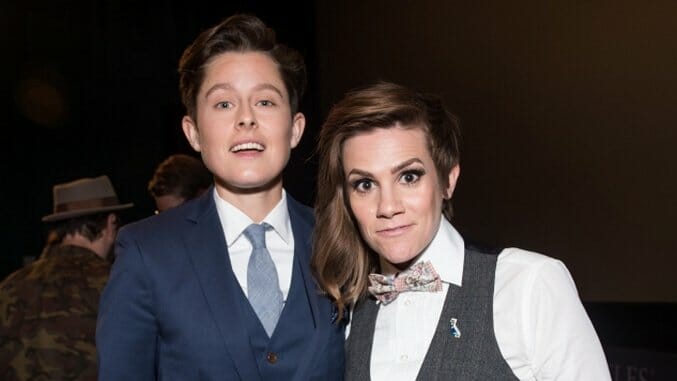A Mutual Admiration Society: Cameron Esposito, Rhea Butcher and Take My Wife
Photo by Emma McIntyre / Getty Images
In their new Seeso show, Take My Wife, Cameron Esposito and Rhea Butcher give new meaning to Henny Youngman’s best-known one-liner. The real-life couple, who were married last December, are not only breaking gender barriers but they’re crossing comedy boundaries as well. (Just try and name any other lesbian couple producing, writing and starring in their own show.)
At last week’s Los Angeles premiere of Take My Wife, Esposito and Butcher arrived in casual cool attire, perfect for an L.A. event. In dark jeans, waistcoats and ties, Esposito donned a bowtie, while Butcher chose a suitcoat to wear with her traditional tie. The two were greeted by friends and fans alike when they entered the Los Angeles Film School lobby for the screening. Paste was allotted a few minutes for an interview, so we ducked into a kitchenette that doubled as an impromptu, no-frills greenroom. Esposito and Butcher were immediately apologetic to the couple who were trying to chow down their Jack-in-the-Box dinners in private.
When meeting the comics in real life, their onstage stand-up styles make complete sense. Both are down-to-earth, but Chicago native Esposito is the more loquacious of the pair, barreling ahead to get her thoughts out, while the Akron, Ohio-raised Butcher is quieter, more reserved and waits for the perfect moment to deadpan a zinger herself. “I would describe Rhea as ‘brilliantly understated,’” Esposito said. “I think what makes Rhea’s comedy so great is that she’s not selling it. She’s just speaking truth and people come to her. It’s unlike anything that I’ve ever done on stage.” Butcher reciprocated, “And I would say Cameron is a ‘fiercely personal.’ And I mean personal in the ‘personal is political’ way.”
-

-

-

-

-

-

-

-

-

-

-

-

-

-

-

-

-

-

-

-

-

-

-

-

-

-

-

-

-

-

-

-

-

-

-

-

-

-

-

-








































